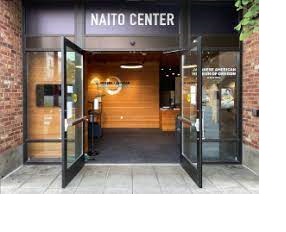Return to Old Town
Hard and relentless rain smashed Portland. Everything was heavy and gray on a Saturday morning in January.
I was determined to get off my ass and do something rather than read more about the most mysterious person in American history—Emily Dickinson. The more you read her poetry and biographies, the more opaque and complicated she becomes. Bob Dylan is as easy to read as a phone book compared to her.
My destination—the Japanese American Museum of Oregon in the corroded heart of Old Town, the epicenter of Portland’s homeless disaster.
The last visit to Old Town of six months ago on behalf of my homeless friend Mark had left me shattered and disillusioned as a human being and Oregonian. And that was on sunny day with roses blooming. Today I would venture into the abyss (AKA Apocalypse Now) during a deluge on a winter day to avail myself of a cultural offering.
The forced relocation of Japanese Americans into concentration camps in the aftermath of the attack on Pearl Harbor has fascinated me since I was a kid and still feels inadequately explored by novelists, historians, journalists and filmmakers. For one reason, the story is still going on and reparations to those Americans dispossessed of life, liberty and property in places such as Hood River have been pitiful. Those Oregon families that prospered by cheating and robbing their former neighbors have never been properly called out.
Portland’s Old Town has a unique history related to the Japanese-American concentration camp story. The Naito Family of Portland gave up everything in the round-up hysteria and moved to Utah and somehow evaded internment. After the war they returned and two Naito Brothers, Bill and Sam, slowly built a business empire in Old Town (and downtown) and created among other enterprises, Import Plaza, Made in Oregon stores and a place I used to grade papers when I taught in Portland, The Galleria. They also helped establish the Japanese American Historic Plaza and the very museum I was about to visit. They were were easily two of the finest and hardworking people in the history of modern Portland. My Portland life was certainly enhanced by their entrepreneurship and I feel embarrassed for leaving out their voices in my anthology of Oregon history commemorating the state’s sesquicentennial in 2009.
The Naito Brothers helped rescue Old Tow from blight and obscurity in the 70s and 80s and became civic leaders. One wonders what they would have thought of the abyss of Old Town today. One wonders what they would have done to address the crisis. I can’t believe they wouldn’t have taken direct action to house people and keep them from disintegrating on the streets in abject debasement. Surely, they wouldn’t have left it to the non profits, the city, the county. They were not men of dithering or excuse-making or the jargon of advocacy gobbledygook. They got shit done and done right.
We’ll never know.
I parked my car. Incredibly, the City expected me to pay for parking in a semi combat zone. I went to pay and the machine was shattered and dead. Across the street a young man with a blanket over his head was stationary and screaming in anger. Another man wearing a sleeping bag was silent and on the move.
The museum was a block away. During my walk, I determined that four of the ten vehicles parked on one street were serving as domiciles: three sedans, one van. Two had dogs inside.
An Oregon Homeless Age (OHA) man sat on the sidewalk in front of the entrance to the museum. He was gesticulating, twitching and speaking in tongues.
I paid my $8 admission fee and toured the tiny excellent museum and had the whole place to myself. My mind filled with new information, ideas and insights and I signed up for a zine workshop the museum was holding in a couple weeks, so yes there would be another visit to Old Town.
The OHA man had vanished from the entrance and I stepped outside into rain. Across the street, an abandoned lot hosted several tents and various piles of strange refuse. Several men were pushing shopping carts full of cans and bottles. A few OHA men and women rode kids bicycles in the distance.
On the walk to my car, I noticed yellow parking tickets on the windshields of all the vehicles that weren’t serving as domiciles. It was totally absurd but made perfect sense. Why expend any effort to collect fines from people who have no driver’s licenses, addresses, registrations, and no means to pay fines? What really is there to be done?
Interestingly enough, I didn’t get a ticket. Must have been my lucky rainy day.

